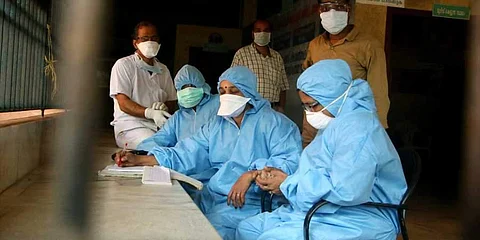

A week ago, Dr Kamna Kakkar, a young medico from Haryana took it to social media to raise the issue of them not being provided with enough N95 masks and other safety gear. The governments and authorities were blamed for ignoring the safety protocol and for putting the lives of doctors and medicos at risk. However, the lives of Dr Arif* and Dr Aman*, house surgeons at the Government Medical College, Ernakulam, Kerala, are in stark contrast to that of Kamna's.
These young medicos tell us that the government and the authorities of the medical college, which is soon to become Kerala's first Coronavirus treatment centre, had always put the safety of the professionals first. For the past one and a half months, Aman has been working in the medical college's Corona Control Room, which coordinates the isolation ward. "All the medical professionals here have enough supply of safety gear. Even if there's a delay in the government supply, the hospital fixes it by making a local purchase," he says.
It is probably redundant to ask a doctor if he's scared of treating a patient with Corona. However, we couldn't contain our curiosity. The answer wasn't surprising. "Two years ago, we faced the Nipah virus and Kerala was able to combat it successfully. COVID-19 is easier to deal with comparatively. Even though the infection rate is high, the mortality rate is very less," says Aman. "We can always stay safe. It affects the elderly a lot though, but the young have a very high chance of survival. Also, a doctor is always prone to getting infected by a retrovirus or Hepatitis B," he says.
Arif, on the other hand, works in the Casualty Department and admits that he wasn't completely fearless. "The survival rate in case of COVID-19 is pretty high among youngsters, so even if I get infected, I am ok. But, I do not want to act as a carrier and infect somebody," he says. "I haven't gone home fearing this. I only go out (apart from work) when it is absolutely necessary," he says. Aman had something similar to share too. "My family isn't scared. I have educated them about the virus. But, it is always important for us to act wisely and not spread it. Therefore, even though the protocol doesn't mandate us to self-quarantine, I haven't gone home since we had the first patient," he says.
Surprisingly, both medicos also tell us that their work hours have come down substantially, since the pandemic outbreak. "Everything is properly planned here to make sure that we are not infected and not act as carriers. So, we are not asked to work beyond regular hours these days," says Aman. "In the past, we have had 60-hour-long shifts. However, since the outbreak, the hours have come down. On one day, I had to work only for four hours," says Arif.
These medicos say that even though they do not face administrative difficulties, the only trouble they come across is the negative attitude of people. "Most of the patients are aware of the situation. However, some of them are quite stubborn and do not believe in modern medicine. Also, we had a few patients from the UK who looked down upon our health system initially," says Aman. However, every problem has a solution. "We have a team of psychiatrists who counsel the patients and their bystanders. The patients from the UK cooperated with us afterwards and they were completely cured," he adds.
Now we couldn't hold back medicos from doing their job, especially during a health crisis. They had lives to save. Not every superhero wear a cape, some wear white coats.
